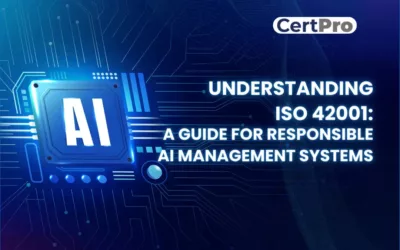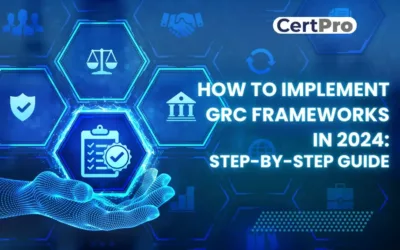ISO 21001:2018
MANAGEMENT SYSTEMS FOR EDUCATIONAL ORGANIZATIONS
Education empowers individuals to uplift their living standards and contribute to their communities, making them valuable citizens. It fosters skill development, broadens horizons, and provides a better life perspective. Based on clear and measurable standards, education prepares learners for the future, work, and life. The International Organization for Standardization (ISO) created ISO 21001 Certification, which enhances educational institutions and establishes a productive teaching-learning environment.
ISO 21001 Certification for Educational Organization Management System (EOMS) establishes flexible, transparent, and inclusive classrooms, enabling personalized learning to meet individual learner needs. It facilitates the implementation of best practices, improving education quality through teacher training. ISO 21001:2018 certification guarantees the requirement of the highest quality instruction for learners and will increasingly gain recognition as an independent measure of an education provider’s quality. Thus, any organization involved in teaching and training benefits from evaluating its education management against this standard.
It encourages an educational approach that centers around learners, actively engaging them in their learning process. The ISO released ISO 21001 in 2018 to help educational institutions provide high-quality services, ensuring equitable and accessible education for all, including individualized learning for those with special needs and distance learners.

ISO 21001:2018 CERTIFICATION AND AUDITING SERVICES BY CERTPRO
At CertPro, we understand the significance of adhering to ISO 21001:2018 standards and the benefits of obtaining ISO 21001 certification for organizations seeking to enhance their educational organization management. We offer extensive assistance to organizations seeking ISO 21001 certification. Our team of experts will support you at every step of the certification process, ensuring that your educational practices align with the latest ISO 21001 requirements. We will work closely with your team to design and implement a tailored educational organization management system that caters to your unique needs and complies with industry regulations.
WHY CHOOSE CERTPRO FOR ISO 21001:2018 CERTIFICATION AND AUDITING?
CertPro is an esteemed and dependable collaborator for ISO 21001:2018 certification and auditing services. With our vast experience spanning almost a decade, we have acquired an in-depth comprehension of the intricacies of managing educational organizations. Our expertise in this field makes us a trusted choice for fulfilling your ISO 21001 certification needs. We offer compelling reasons why CertPro is the perfect choice to meet your ISO 21001 certification needs:
| Factors | CertPro Advantage |
|---|---|
| Time to Certification | 4x faster than traditional approaches |
| Price | Competitive rates with flexible options |
| Process | Streamlined and efficient methodology |
| Expertise | 10+ years of industry experience |
CERTPRO’S COST-EFFECTIVE APPROACH TO ISO 21001:2018 CERTIFICATION
For ISO 21001:2018 certification, the overall cost is a crucial aspect to assess, considering the various factors that impact expenses. At CertPro, we recognize the significance of cost-effectiveness and endeavor to deliver customized and budget-friendly solutions to fulfill your organization’s ISO 21001 requirements. Here is a summary of our cost-effective approach to ISO 21001:2018 certification:
| No. of employees | Timeline | Cost (approx.) |
| 1 – 25 | 4 weeks | 2500 USD |
| 25-100 | 6 weeks | 4500 USD |
| 100-250 | 8 weeks | 7500 USD |
| 250 plus | 8-12 weeks | Custom plans |
UNDERSTANDING ISO 21001:2018 THE BASICS OF EDUCATION MANAGEMENT SYSTEM
ISO 21001 is an educational management system that standardizes education management to meet the needs of learners. ISO 21001 aims to assist schools, colleges, training providers, and other educational organizations in adopting best practices. Based on the widely adopted ISO 9001 quality management system guidelines for the education sector, ISO 21001 aims to improve the provision of educational products and services. These guidelines apply to educational organizations at all levels, including elementary, medium, and higher education, as well as distance and e-learning. Given the significant variation in education quality worldwide, ISO 21001 seeks to address this issue as an Educational Organization Management System (EOMS). To achieve this goal, ISO 21001 emphasizes several concepts related to best practices in education management:
- Training and competence of facilitators and teachers to ensure education quality.
- A learner-centric approach prioritizes learners’ needs and preferences.
- Provision of good resources and facilities to support effective learning.
- Relevance of curriculum and learning materials to meet the specific needs of learners
- Provision of support from families and society to enhance the learning experience.
- Incorporation of a gender-sensitive design to promote inclusivity and equality.
- Making a safe and welcoming learning environment for all students.
ISO 21001 acknowledges the transformative influence of technology on various aspects of the education system, including enhancing efficiency in homework assignments and grading to provide tailored assistance to students with special needs. The objective of this standard is to assist educational institutions in enhancing their teaching and training approaches by integrating these principles and goals, thereby improving overall quality.
THE PRINCIPLES FOR AN EOMS
ISO 21001 Certification for Educational Organization Management System (EOMS) adheres to 11 principles, which include:
- Focus on learners and other beneficiaries: The EOMS places paramount importance on meeting the requirements and surpassing the expectations of learners and other beneficiaries.
- Visionary Leadership: Engaging all learners and beneficiaries in crafting, implementing, and embodying the organization’s mission, vision, and objectives forms the essence of visionary leadership.
- Engagement of people: Ensuring the competency, empowerment, and active involvement of all individuals within the organization is crucial for delivering value.
- Process Approach: Attaining consistent and predictable results is enhanced through the effective and efficient understanding and management of interrelated activities as cohesive processes. It involves considering input and output within a coherent system.
- Improvement: Flourishing organizations maintain a perpetual focus on improvement.
- Evidence-based decisions: Making decisions and crafting curricula based on thorough data analysis and evaluation increases the likelihood of achieving desired outcomes.
- Relationship Management: Organizations ensure sustained success by effectively managing their relationships with various stakeholders, including providers and other interested parties.
- Social Responsibility: Actively embracing social responsibility enables organizations to achieve sustainability and long-term success.
- Accessibility and Equity: Achieving success involves creating inclusive, transparent, and accountable organizations that proactively address the individual and special needs, interests, abilities, and backgrounds of learners.
- Ethical Conduct in Education: Ethical conduct involves the organization’s ability to create an Ethical professional environment by treating all interested parties equitably, avoiding conflicts of interest, and conducting activities for the benefit of society.
- Data Security and Protection: The organization establishes a secure environment that instills confidence in all interested parties regarding their data. They maintain control over the use of their data, while the educational organization ensures appropriate care and confidentiality in handling their data.
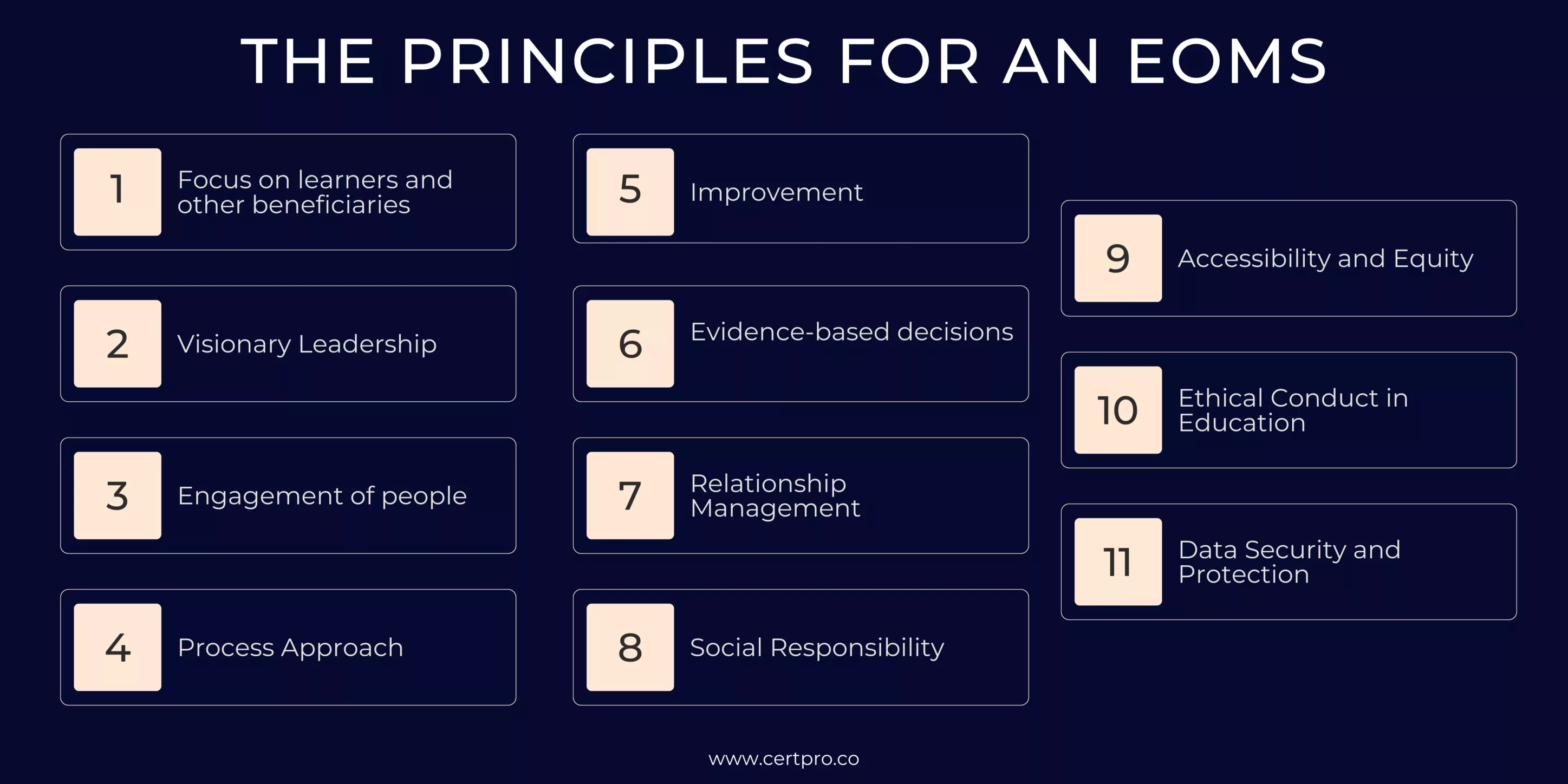
STEPS TO OBTAIN ISO 21001:2018 CERTIFICATION
Before commencing the certification process, an organization must actively assess its Educational Organization Management System according to ISO 21001 requirements. Through the essential documentation of all stages.
During the certification process, we collaborate with you to implement the following steps:
Step 1: Documentation Review and Audit
The process begins with a comprehensive review of the organization’s documentation, including policies, procedures, and records related to educational management. Auditors conduct an assessment to evaluate the organization’s adherence to ISO 21001 requirements.
Step 2: On-site Audit
After the documentation review, certified auditors conduct an on-site audit. They visit the educational organization to assess the implementation and effectiveness of the management system according to ISO 21001 requirements. It includes evaluating processes, conducting interviews, and reviewing records to ensure compliance and identify areas for improvement.
Step 3: Implementation of Audit Team Recommendations
The organization identifies and implements measures to address the root cause of any non-conformances identified during the audit. It involves taking corrective actions to rectify any issues and implementing necessary improvements to ensure compliance with ISO 21001 requirements and enhance the effectiveness of the educational management system.
Step 4: Certification Issuance
After successfully meeting all ISO 21001 requirements and implementing changes based on the audit team’s recommendations, the organization receives the ISO 21001 certificate. This certification includes the official certification mark, which can be used on branding and promotional materials, signifying the organization’s commitment to recognized quality assurance.
Step 5: Surveillance Audits
To maintain the validity of the ISO 21001 certification, certified auditors conduct annual surveillance audits. These audits ensure that the educational organization consistently meets ISO 21001 requirements and effectively implements the management system. The surveillance audits actively assess the organization’s ongoing compliance and commitment to providing quality education.
Step 6: Recertification
After the initial certification, a recertification process is initiated three months before the expiration of the Certificate of Approval. This process includes conducting an audit to evaluate the organization’s adherence to ISO 21001 requirements. The recertification audit ensures that the educational organization maintains its certification status and commitment to quality education.
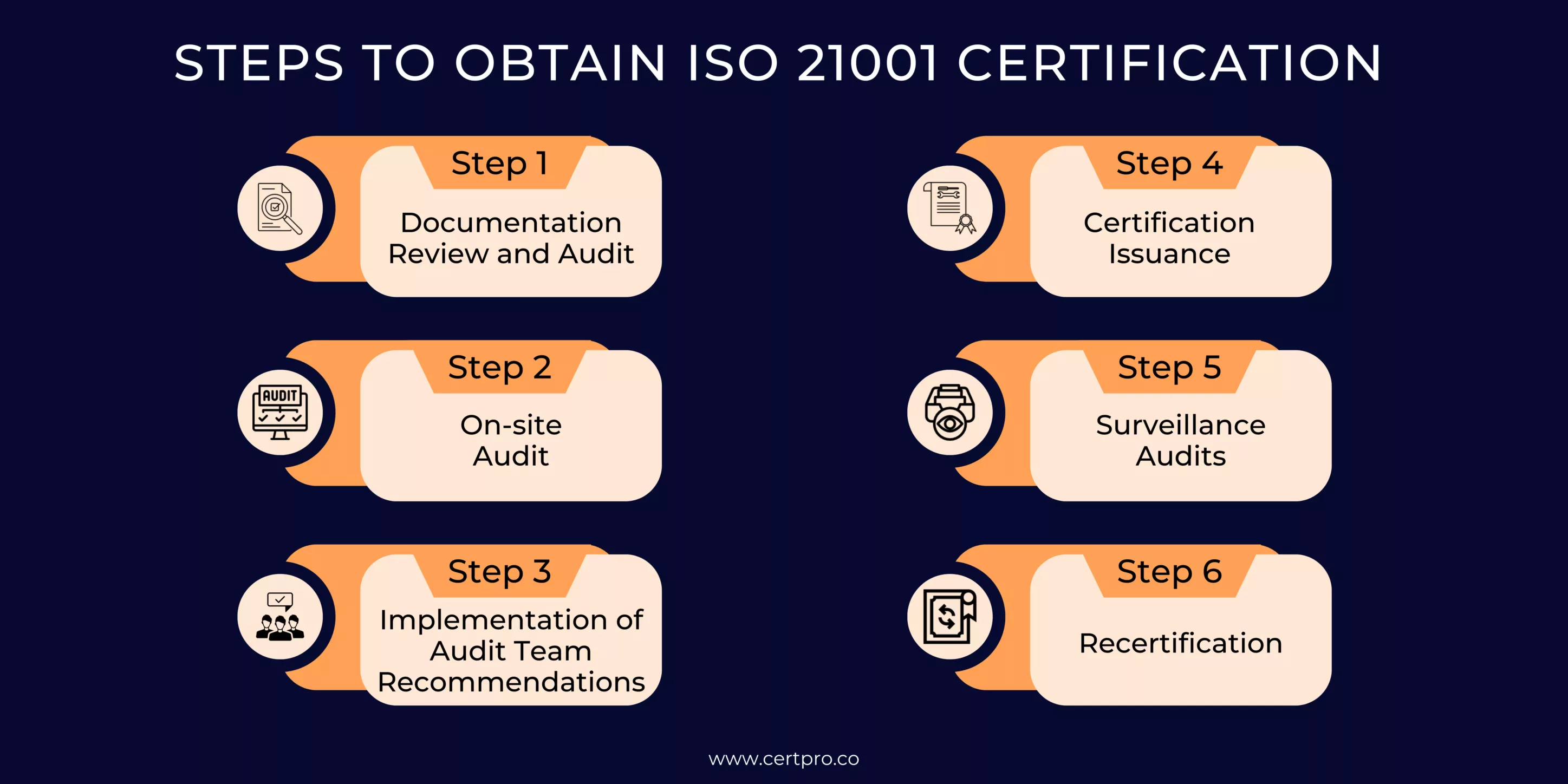
THE REQUIREMENTS OF ISO 21001:2018 Certification
The ISO 21001 certification comprises ten sections (clauses) that adhere to the Plan-Do-Check-Act cycle. Among these sections, three serve as introductions, while the remaining seven outline the obligatory requirements of the Educational Organization Management System (EOMS). These seven clauses are as follows:
Clause 4: Context of the organization
The organization is responsible for identifying and addressing internal and external factors relevant to the Educational Organization Management System (EOMS). It includes formulating strategies to achieve desired outcomes, encompassing the organization’s purpose and social responsibilities.
Clause 5: Leadership
The top-level management holds accountability and responsibility for the efficacy of the Educational Organization Management System (EOMS). It necessitates demonstrating unwavering commitment, strong leadership, and effectively communicating the significance of an efficient EOMS. Senior management integrates EOMS requirements into the organization’s procedures, ensuring their incorporation and implementation.
Clause 6: Planning
Each organization must embrace risk-based thinking and identify potential EOMS-related issues. It is necessary to create plans and policies to address the identified risks and opportunities effectively.
Clause 7: Support
Organizations are responsible for defining and allocating the necessary resources to establish, implement, and maintain the Educational Organization Management System (EOMS). It includes fostering learner engagement, promoting activities that enhance learning, and developing staff competencies to effectively achieve desired learning outcomes.
Clause 8: Operation
Aligned with Section 6 (Planning), organizations must plan, execute, and manage processes to fulfill the needs and demands of learners, stakeholders, and other beneficiaries. They must review and address unforeseen outcomes, promptly taking corrective measures to mitigate any adverse effects.
Clause 9: Performance Evaluation
Organizations should implement a systematic approach to address complaints and appeals reflectively and constructively. This section provides tools for monitoring, measuring, analyzing, and evaluating processes to ensure the achievement of intended outcomes.
Clause 10: Improvement
Organizations must assess their actions to detect non-conformities and take appropriate corrective measures. The principle of continual improvement ensures the sustainability, adequacy, and effectiveness of the Educational Organization Management System, fostering ongoing enhancement in educational processes and outcomes.
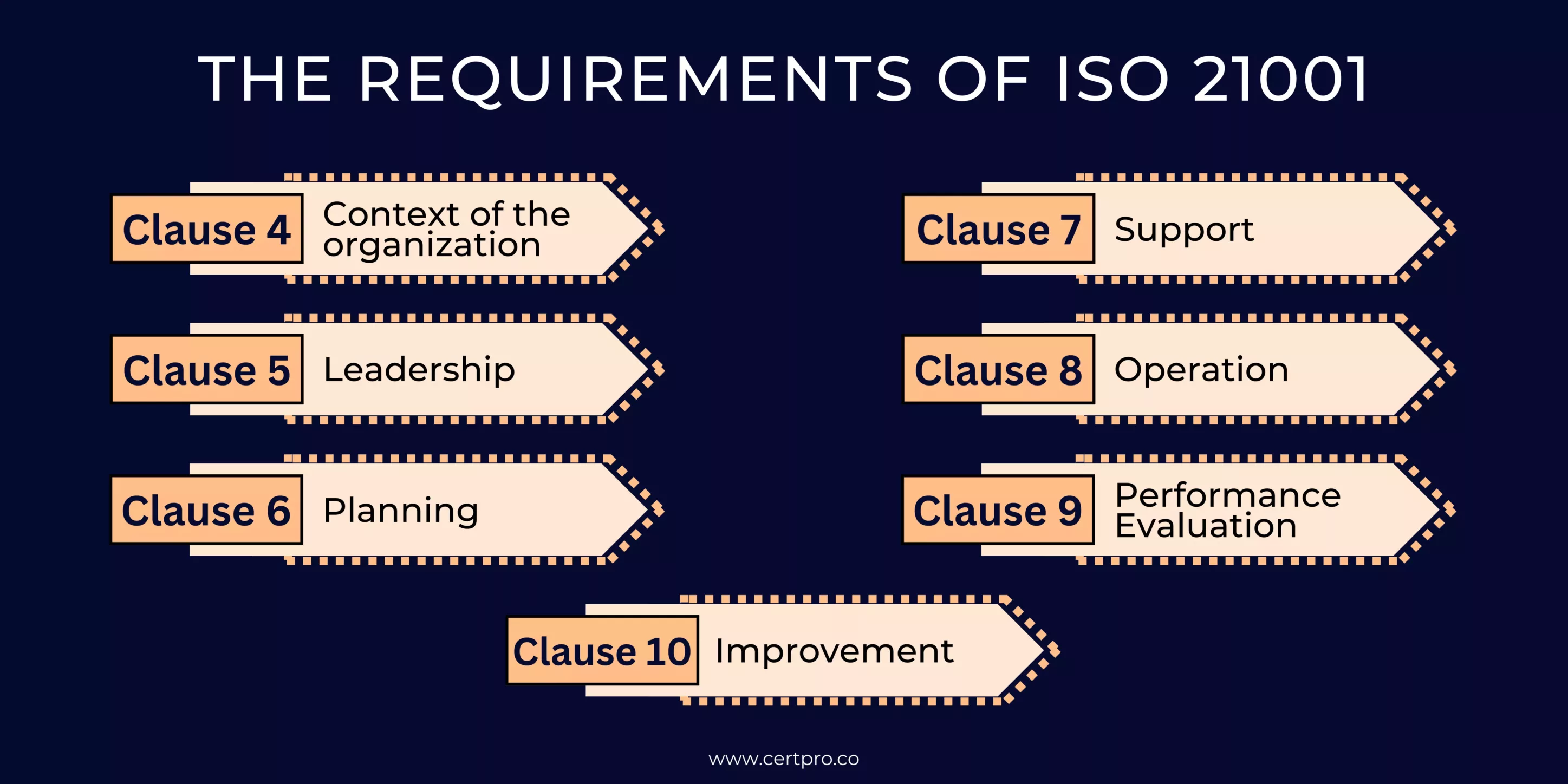
BENEFITS OF ISO 21001:2018 CERTIFICATION
The ISO 21001 certification for the Educational Organization Management System (EOMS) provides the following benefits:
- Improves alignment of objectives and policies, enhancing the organization’s reliability and credibility.
- Facilitates personalized learning, making education accessible to learners regardless of their religious background, origin, gender, or disability.
- Promotes inclusive education and equips educational organizations with tools and techniques to meet the expectations of diverse learners, including those with disabilities and in linguistically diverse classrooms.
- Demonstrates an organization’s commitment and ability to deliver quality education that exceeds learner expectations through ISO 21001 certification compliance.
- Harmonizes regional, national, and international laws, regulations, and standards into a unified framework, providing a holistic approach for organizations.
- Enhances the social responsibility of educational organizations by ensuring equitable, accessible, and quality education for all.
ELIGIBILITY FOR ISO 21001:2018 CERTIFICATION
ISO 21001 certification is suitable for a wide range of educational organizations, irrespective of their size or type. It applies to schools, colleges, universities, vocational institutions, training providers, and other entities offering educational products and services. This certification applies to organizations operating at various levels, including pre-schools, K–12 schools, and adult education centers. It also caters to specialized institutions such as special education schools and tutoring or coaching centers. ISO 21001 is flexible enough to accommodate different modes of education, whether traditional classroom-based learning, online learning, or distance education. Both public and private educational organizations can pursue ISO 21001 certification if they strive to enhance learner satisfaction and improve the effectiveness of their educational processes.
ISO 21001:2018 CERTIFICATION COST
The cost of ISO 21001 certification varies based on several factors. One significant factor is whether your organization has already implemented a certified ISO management system. Furthermore, the size of your company and the complexity of your quality management system can influence the duration of the audit and, consequently, the price.
Assessing the specific costs for ISO 21001 certification is necessary on a case-by-case basis due to these variables. Organizations must consult with a certification body or an authorized third-party organization to determine the accurate cost based on their unique circumstances. They will consider factors such as the scope of certification, the number of locations, and any specific requirements or additional services needed. This tailored approach ensures a precise evaluation of the certification costs for ISO 21001 compliance.
CHALLENGES AND SOLUTIONS IN IMPLEMENTING ISO 21001:2018
- Expansive Scope: Implementing ISO 21001:2018 covers diverse educational levels and modes of learning, posing implementation challenges.
- Efficient planning and coordination can help address the Expansive scope.
- A Multitude of Support Services: ISO 21001:2018 encompasses various institution support services like libraries, counseling, and dining facilities.
- Streamline and manage support services efficiently to ensure effective integration within the ISO 21001 framework.
- Accreditation and Certification: Ensuring highly qualified audit teams and achieving a cost-efficient balance during accreditation and certification
- Engage highly qualified audit teams and optimize audit durations to achieve cost efficiency in accreditation and certification.
- Lack of Awareness: Lack of awareness regarding standard requirements and the implementation process affects EOMS’ confidence and culture.
- Promoting awareness and fostering a quality culture through training and communication enhances EOMS’s confidence.
- Time Management: Time constraints and heavy workloads for university staff require dedicated teams and adequate training for successful implementation.
- Assign a dedicated, well-trained team to implement the quality management system and provide adequate training.
- Resistance to Changes: Overcome resistance to change by effectively managing organizational resistance and creating a supportive culture and structure.
- Address resistance to change in higher education institutions through effective management and fostering a culture of openness and continuous improvement.
- Top management commitment: Lack of Top management commitment hinders the implementation of educational organization management in higher education.
- Encouraging and fostering top management commitment is crucial for the successful implementation of educational organization management.
- Lack of resources: Insufficient resources, whether human or financial, pose a challenge to effectively implementing ISO 21001 in higher education.
- Implement effective resource management to ensure adequate human and financial resources for ISO 21001 implementation.
VALIDITY OF ISO 21001:2018 CERTIFICATION
Once certified, ISO 21001 certification remains valid for a specific period, usually three years from the date of issuance. During this time, the educational organization must undergo annual surveillance audits to ensure enduring compliance with ISO 21001 requirements. These audits assess the organization’s continued commitment to maintaining an effective Educational Organization Management System (EOMS) and meeting the needs of learners and stakeholders. After three years, the certification expires, and the organization must initiate the recertification process. The recertification process involves another audit to evaluate the organization’s adherence to ISO 21001 standards and continual improvement efforts. By maintaining ISO 21001 certification, educational organizations can demonstrate their dedication to providing quality education and ensuring learner-centric approaches, enhancing their credibility and reputation in the education sector.
CERTPRO’S ROLE IN ISO 27018:2018 CERTIFICATION
CertPro specializes in helping businesses achieve ISO 21001 certification, a standard that focuses on educational organizations and their management systems. With a team of experienced auditors and consultants, CertPro guides your business through the certification process, ensuring compliance with ISO 21001 requirements. They assess your educational management system, identify areas for improvement, and help implement effective strategies and controls. CertPro provides documentation support and expert guidance to align your organization with ISO 21001 standards. By partnering with CertPro, your business can demonstrate its commitment to providing quality education, improving student satisfaction, and enhancing the overall learning experience. Achieving ISO 21001 certification with CertPro’s assistance strengthens your educational institution’s reputation, attracts more students, and positions your organization as a leader in the education sector.
FAQ’s
HOW DOES ISO 21001 DEFINE QUALITY MANAGEMENT?
ISO 21001 defines Quality Management as a set of requirements for educational organizations, focusing on meeting the learning needs of learners, developing appropriate content, and evaluating outcomes. It establishes a management system to ensure educational provision and continuous improvement, enhancing the overall quality of education.
WHY SHOULD A SCHOOLS ORGANIZATION SEEK ISO 21001 CERTIFICATION?
ISO 21001 certification offers several benefits to educational organizations. It demonstrates their commitment to providing quality education and meeting learners’ needs. It enhances their reputation, increases stakeholders’ confidence, and helps attract students, parents, and funding organizations. ISO 21001 certification also promotes continual improvement and effective management practices.
HOW LONG DOES IT TAKE TO GET ISO 21001 CERTIFIED?
The time required for ISO 21001 certification depends on several factors, including the organization’s size, readiness, and complexity. The implementation and certification processes typically take several months. It involves activities such as system development, training, internal audits, and the final external audit by the certification body.
WHAT ARE THE IMPLICATIONS OF NON-COMPLIANCE WITH ISO 21001?
Non-compliance with ISO 21001 can have various implications for educational organizations. These may include a loss of ISO 21001 certification, compromised quality of education provision, decreased stakeholder confidence, potential legal or regulatory consequences, and missed opportunities for improvement and enhancement of the Educational Organization Management System (EOMS).
CAN ISO 21001 CERTIFICATION BE TRANSFERRED TO ANOTHER CERTIFICATION BODY?
One cannot directly transfer ISO 21001 certification from one certification body to another. If an organization wishes to change certification bodies, it would need to undergo a new certification process with the new certification body, including initial audits, to obtain certification from the new body.
UNDERSTANDING ISO 42001: A GUIDE FOR RESPONSIBLE AI MANAGEMENT SYSTEMS
The invention of artificial intelligence (AI) has changed the operational processes of many industries. However, the rapid growth of technology increases ethical, security, and privacy-related concerns. Therefore, the International Organization for Standardization...
EUROPEAN UNION’S ARTIFICIAL INTELLIGENCE ACT: HOW THIS GROUNDBREAKING LAW AFFECTS YOUR BUSINESS
Nowadays, Artificial Intelligence (AI) is transforming our lives exceptionally well. AI is now streamlining healthcare services, providing virtual assistance, and fulfilling queries. Technologies have boons and curses. Similarly, AI creates many concerns about...
How to Implement GRC Frameworks in 2024: Step-by-Step Guide
The rapidly evolving business environment, complexity, and accountability enhance the importance of the organization's governance, risk management, and compliance initiatives. Therefore, if your company finds difficulties expanding, recheck your organization's...

